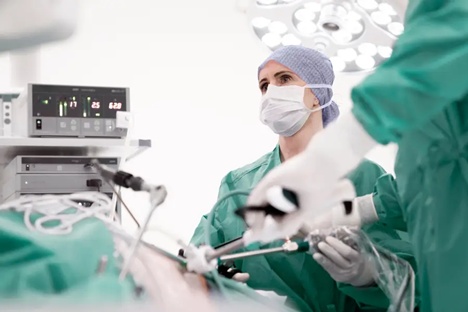Gastric Bypass Surgery
Gastric Bypass Surgery in Ohio
If you are experiencing major health or lifestyle complications due to excess weight, you may be a good candidate for a weight loss surgery or procedure like gastric bypass. Gastric bypass surgery is recommended for people who have been diagnosed with obesity or weight-related health problems and have not had success losing weight with traditional diet and exercise methods.
At Best Life Bariatrics and Medical Weight Loss, we understand that the decision to undergo weight loss surgery is highly personal. We will help you understand the benefits and risks of undergoing gastric bypass and give you the information you need to make an informed decision. Our goal is to help you improve your health, self-esteem, and quality of life. Call now to schedule a consultation to learn more about gastric bypass surgery in Ohio.
What Is Gastric Bypass Surgery?

Who Should Consider Weight Loss Surgery like Gastric Bypass?
Your doctor or weight loss physician can help you determine if you are a good candidate for weight loss surgery. You might consider gastric bypass if you:
- Have a BMI of 35 or higher
- Have a BMI greater than 30 with diabetes
- Are committed to making major lifestyle changes both before and after surgery
- Have major health problems related to your weight or weight gain
- Are at risk of type 2 diabetes, sleep apnea, high blood pressure, high cholesterol, osteoarthritis, or other medical conditions due to your weight
What to Expect Before Gastric Bypass
Before we schedule your surgery, you will need to undergo a comprehensive consultation and evaluation process. We will need to gather information about your medical history, family health history, past medical procedures and diets, and lifestyle habits. We will have you do a full health screening, and we will order lab work to evaluate your overall health. We will also answer any questions you have and fully explain the potential gastric bypass surgery risks and complications. Before your surgery, we will give you detailed, personalized information about the gastric bypass surgery diet you will need to follow and lifestyle changes you will need to make. This may include:
- Following a high protein, low fat, and low carbohydrate diet
- Practicing portion control
- Eating slowly
- Not drinking liquids with meals
- Eliminating alcohol and sugary foods and drinks from your diet
- Quitting smoking
- Getting at least 30 minutes of moderate physical activity per day
- Attending counseling sessions or support groups
- Taking multivitamins or other supplements as recommended
How the Gastric Bypass Operation Is Performed
The gastric bypass operation is performed laparoscopically. This means that we make small incisions in your abdomen and insert long, narrow laparoscopic tools. Your surgeon will inflate your abdominal cavity and divide your stomach into two sections using surgical staples. This leaves your working stomach pouch about the size of an egg. Next, they will divide your small intestine, bringing its lower segment up to your new stomach pouch. Finally, they will reattach the upper segment of your small intestine to a point further down in your abdominal cavity.
Benefits of Undergoing Gastric Bypass for Weight Loss
The biggest benefit of gastric bypass is the improvement it will make to your overall health. Other benefits include:
- Significant weight loss
- Improved quality of life
- Greater chance of long-term or sustainable weight loss success
- Better body image and self-esteem
- Reduced risk of weight-related health concerns like heart disease, type 2 diabetes, sleep apnea, high cholesterol, high blood pressure, joint pain, fatigue, and depression
Gastric Bypass Surgery Recovery Time
Potential Gastric Bypass Side Effects, Complications, and Risks
Like any other surgical procedure, undergoing a gastric bypass surgery has risks. We will make sure you understand all potential gastric bypass surgery side effects before you schedule your procedure. The most common gastric bypass complications are:
- Infection
- Bleeding
- Poor reaction to anesthesia
- Hernia
- Small bowel obstruction
- Anastomotic leaks
- Dumping syndrome
- Malnutrition
- Bile reflux
- Gallstones